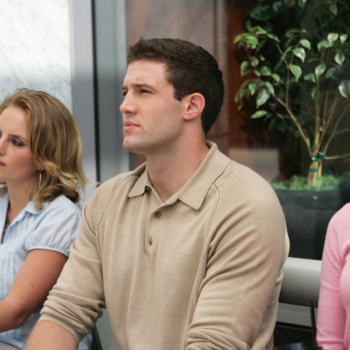Supporting Grieving Families: tips for RNs and others on the front line
/ Supporting a Griever : Litsa Williams
We have a series here at What's Your Grief called 'What's Your Question', where we tackle the grief questions that have been eating away at you. Several weeks ago we got a question from an ER nurse who was struggling with supporting grieving families after a death in the emergency room. Though she had over 20 years of experience in the ER, she shared what so many who work in healthcare know – that supporting a family who has just lost a family member can feel impossible.
Helping people clinically is one thing, but knowing what to say or do when a family has just suffered the loss of someone they love is not something you are prepared for. It seems absurd, but the reality is that most physicians have no more than a couple hours of training on how to have family meetings, break bad news, or support grieving families.
Many nurses spend hours in nursing school practicing charting, blood draws, medication administration, physical assessments, and a million other things, but never get training on how to support a family who has just lost someone. It is no surprise that the nurse who emailed us, like so many others, felt ill-equipped. She asked us what to say to a family who has just lost someone and how to manage the overwhelming emotions you feel as a nurse in these situations.
Having both worked in an acute care setting, supporting grieving families at the time of their loved one's death, we are no strangers to the challenges nurses face when a patient dies. Nurses have other patients to care for, they often have received little training in supporting families at the time of a death, and yet families look to them for support. Many hospitals have only a handful of social workers and chaplains for the whole hospital, so finding someone trained to support families is often not an option, especially during off hours.
So, what’s a nurse to do? The answer isn’t easy, but here are some tips we think may help nurses take the best care of families while also taking the best care of themselves.
For the Family
To start, please check out our post “Grief Support vs. Comfort: A pro-tip for the compassionate and caring”. This will give you a framework we think is pretty helpful for how you conceptualize your role. If you are feeling too lazy to click over to that post, here are the cliff notes: you probably want to say something to comfort this family, to somehow make them feel better. Because you are a nurse and you are supposed to provide comfort, right!?!
Bad news first: there is nothing you can say at this moment to take their pain away and there is no right thing to say. Good news, pressures off to come up with the right thing to say! Your role is not to comfort, it is to provide support. What that support is will be different for every family, because each family will have different needs. But in moments of crisis and shock, helping with meeting a family's basic, practical needs can be the biggest help. Take your cues from the family, and keep in mind some of the following things that are often helpful to families:
Ask about their loved one. If you have spent some time with them and it feels appropriate, ask them to tell you a little about their loved one or show you photos, if they have any. This is easier on units outside the ER, but can be tough in the ER setting when you don't have time to build a rapport with families. Don't push this, only ask if it feels natural.
Ask them what they need. Now, don’t be surprised if many people can’t tell you, because they don’t know what they need. But sometimes they will, so make sure to ask. It may be helpful to give them options when you frame the question. "What can I do to support you guys right now? I can call other family for you, provide a medical letter for your employer/school, contact a funeral home [insert other practical needs here!] or I can just give you some time".
Help them connect with those who will best support them. Ask if they need help calling anyone and discuss who will be their support in the days, weeks, and months to come. Determine how they will be getting home from the hospital, especially if it doesn't seem safe they drive.
Ask if they want to speak with a doctor about any questions that have come up. Make sure there is a doctor available to actual come speak with them, before offering this! If there isn't, let them know you will set it up but it could take some time.
Ask if they would like you to page the Social Worker or Pastoral Care. Again, make sure someone is available before offering this.
Discuss with them if and how they want to spend time with the deceased to say their goodbyes. Normalize that some families wish to see and spend time with their loved one after death and others do not. There is no right or wrong, so make sure they feel supported either way.
Make the goodbye comfortable and meaningful by explaining what they are going to see. Many people may not have seen someone die or a dead body, much less that of a loved one. Prepare them for what to expect.
Offer ‘memory making’ options, if that is a practice in your hospital. Things like hairlocks, thumb prints, or hand prints can be a meaningful way for some families to say goodbye (especially if there are children present).
Answer their questions about what happens next. Many families have no idea how long they have to call a funeral home or what to tell the funeral home, so go over this with them. Explain whether they will stay at the hospital morgue, go to the medical examiner/coroner, etc.
Answer other questions. Some that could come up about autopsy and medical examiner, requesting medical records, documentation for life insurance, and whether there is an financial assistance for funerals/burials in your area.
Acknowledge that you don’t know what to say. If you are struggling with your words, just be honest. Families will understand, because in that moment they know there is nothing anyone could possibly say to fix the situation.
Give them space if they need it. Many families will want time with each other and with the person who just died. Take your cues from the family and give them space if they need it.
Let them know who they can contact once they have left the hospital. Many families are so overwhelmed that it isn’t until hours later or the next day that their questions begin to surface. Let them know how they can reach someone once they’ve left the hospital.
Don’t judge. This sounds obvious, but you would be surprised how often hospital staff impose their grief style or assumptions on families. Some families may weep, some may laugh and joke, some may show no emotion at all. Some may lay in bed with the person, some may not even want to enter the room. Whatever it is, give them the time, space, and understanding they need to grieve in the way that works for them.
For You
Deal with your own ‘stuff’. You know that old expression, “you have to take care of yourself to take care of others”? It applies to grief too. If you don’t deal with your own grief and feelings about death those emotions will creep up on you when you are trying to support others.
Keep your emotions in check. Shedding a tear or two with a family is okay, every now and then. But if you can't control how much you cry, this becomes a problem because the family may feel they have to be the one to comfort you or it may seem like your intruding on their tragedy.
If you can’t control your emotions, seek help. In the moment, seek help from another RN to step in with the family. In the long term, seek help finding ways to cope with these overwhelming emotions. A counselor can be a huge help. We have tips on seeking professional help here.
Use your EAP. Employee Assistance Programs (EAPs) can be great resources for helping you talk about the emotions you’re experiencing and find healthy coping tools. Many hospitals offer this as a benefit to staff, so take advantage!
Leave work at work. I know this is waaaay easier said than done, but look for tools to help with this. For some people it is going to the gym or for a run after work to release the stress of the day. For some people it is as simple as taking a shower and consciously letting go of the day. Meditation, crafting, and cooking can all also be helpful tools for letting go of the day and focusing on something else.
Find a self-care strategy that works for you. If you need some help figuring out what self-care tips and tricks may be best for you, check out our post “self-care tips for the rest of us”.
If you are a professional who is often supporting grieving families, it can be a huge help to learn more about grief. Subscribe to get our posts right to your inbox.
We wrote a book!
After writing online articles for What’s Your Grief
for over a decade, we finally wrote a tangible,
real-life book!
What’s Your Grief? Lists to Help you Through Any Loss is for people experiencing any type of loss. This book discusses some of the most common grief experiences and breaks down psychological concepts to help you understand your thoughts and emotions. It also shares useful coping tools, and helps the reader reflect on their unique relationship with grief and loss.
You can find What’s Your Grief? Lists to Help you Through Any Loss wherever you buy books:






Anna Marie Nelson November 23, 2019 at 7:59 am
I’m, a chaplain at a hospital in my family, said they wanted to call the mortuary upon the death of their loved one, and I said that would be fine. I left the unit the next couple of days to follow the nursing director chewed my butt out, saying that is not the process. And another nurse had, oh, she does that all the time, she says, it’s part of the grief process, and I said, no, that’s not true. If the family decides to call more choice, it is true that it is their choice, so why did this nurse makes such a huge deal of an untrue statement and the mixed up one? There’s hospital protocols, because the more trace have to talk to the nurses, but it’s a family is right to call their own mortuary, but to be accused of being out of order, please help me understand, and how to approach this nursing staff. The families are grieving, and nurses are not equipped at all to handle grief because their intensity spills over into inappropriate conversations.
Kristine Virata March 17, 2018 at 11:32 pm
May I know who wrote thins one? so i can properly cite him/her for my research 🙂
Kristine Virata March 17, 2018 at 11:32 pm
May I know who wrote thins one? so i can properly cite him/her for my research 🙂
Elden Gatley February 26, 2016 at 11:55 am
I agree that you should express that you don’t understand what it’s like. I think that some people take empathy too far. They say that they know exactly how the person feels but that doesn’t make the person feel better.
KimberlyGayeta December 8, 2015 at 10:09 pm
This is very accurate! It really is the hardest part of care giving, empathy is always atop everything. Sometimes, it’s really hard to deal with patients, emotions always get in the way, but we have to do our job in any way. Thank you for sharing this, this is very informative. https://myangelshomecare.com/
Meg Lund June 30, 2015 at 2:15 pm
Dealing with a death is hard in any scenario, and I would imagine that the medical persons involved would have just as hard of a time as anyone. I appreciated the second tip under the category “for you” especially. Keeping your emotions in check is one of the most important things to help yourself get through the difficult experience, but it is also helpful for the family who is having to deal and cope with the loss of their loved one, and it is also beneficial for the environment to stay professional. Being able to keep your emotions in check helps the RN stay sane in the situation and approach their coworkers, their patients, and their work in a more reasonable and professional way. https://www.tricitymedical.net
Litsa July 4, 2015 at 9:14 am
You make a good point, Meg. Sometimes medical professionals assume they are (or should be) immune to the difficult emotions of end of life care and death, but that of course isn’t true! Learning to take care of oneself is so important to being able support others, and also to avoid burning out.
https://deathiswhat.com/ August 25, 2014 at 7:58 am
Professionals are people too and have their own angst about death to deal with! My son was hit by a car last year and I vividly remember when the room got quiet and my son began talking through the experience, processing it all and weeping a bit. A nurse came in to take his vitals and began telling him how lucky he was to be alive and while that was very true, he never went back to talking about it all. Of course he is lucky, but people need time and space and room to figure everything out and it would be good for the doctors and nurses to be aware of the process. Thanks so much for the work you do on the site!
Eleanor April 4, 2014 at 9:25 pm
Oh my goodness Maurine, really? I guess doctors are just like everyone, they just want to fix the tears only they have a prescription pad.
Maurine Archer April 2, 2014 at 7:37 pm
This is great. My Dad died a traumatic death when he fell and broke his neck. when I told my primary care doctor 2 mo and 11 days later I cried. He wanted to put me on Paxil!
Annie Mitchell April 1, 2014 at 7:20 am
would love to share my experience with you all
you can read my latest interview and recent publications at above website.
Thank you for looking and showing an interest if I can help with any other related issues let me know.
If you link my publications onto your own website and it is for a charity then I shall donate 10% of my sales.
Regards Annie
Marty Tousley (@GriefHealing) March 31, 2014 at 2:07 pm
Well done, Litsa, and well worth sharing! Thanks so much for writing this! ?